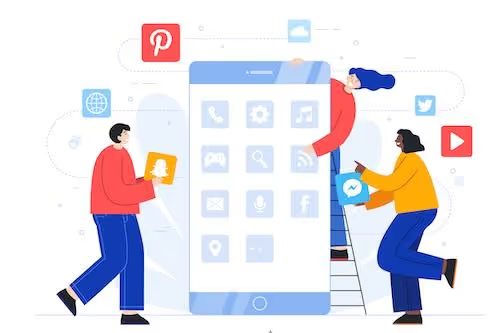Today, your online presence carries almost as much weight as your resume. Hiring teams want a deeper understanding of who you are, how you communicate, and what values you reflect in public spaces. These insights often come from a growing practice called social media screening. Many candidates are unsure what this involves or how it impacts the hiring process. This blog breaks down seven common questions that every job seeker should know before applying to their next role.
1. What exactly is social media screening?
If you have ever wondered what is social media screening, the answer is simple. It is the process of reviewing publicly available social media activity to understand a candidate’s behavior, personality, and suitability for a role. This often includes posts, comments, profile information, shared content, photos, and videos that are visible to the public.
Social media screening is not the same as a traditional background check. Traditional checks verify education, identity, criminal history, or employment records. Social media screening helps employers evaluate how someone behaves in public online spaces, how they interact with others, and whether there are potential risks that may impact the company.
Screening focuses on what is already public. Ethical providers do not ask for passwords or attempt to access private accounts. Only the content that you have chosen to make visible is analyzed. This protects your privacy and keeps the process legally compliant.
2. Why do employers use social media screening?
Employers use social media screening to gain a more complete picture of who they are hiring. A resume often tells only part of the story. Online behavior can reveal qualities that may not show up in an interview.
Several reasons make screening valuable for companies:
Understanding character
Recruiters want to see how you communicate with others, whether you handle conflicts respectfully, and whether you demonstrate professionalism online.
Identifying risks
Posts that include hate speech, threats, harassment, or any form of abusive behavior can indicate potential workplace issues.
Measuring cultural fit
Companies want employees who align with their values. Positive traits such as teamwork, leadership, or community involvement often show up in social media activity.
Verifying information
Information from public profiles can support or confirm the details listed in your resume, especially for roles where online presence is part of the job.
Protecting brand reputation
For public facing roles, companies want to ensure that employees represent them responsibly online.
Social media screening helps organizations reduce risk while making more informed hiring decisions.
3. Is social media screening legal, and will my privacy be violated?
Many candidates fear this part of the hiring process because they are unsure how much access employers have. The good news is that social media screening is legal when done correctly and privacy is protected through clear rules and boundaries.
Consent is required
Just like with other forms of background checks, employers typically need your permission before screening your online activity.
Only public content is reviewed
Reputable screening companies do not access private messages or locked profiles. They only look at what any member of the public can see.
Laws and regulations apply
In several countries, screening providers must follow consumer protection regulations. In the United States, many operate under the Fair Credit Reporting Act. In Europe, providers follow GDPR guidelines that protect data privacy.
Bias must be avoided
Screening tools remove information about protected characteristics such as race, religion, disability, or sexual orientation. This prevents unfair decisions based on personal identity rather than behavior.
Ethical screening prioritizes fairness, privacy, and compliance. Companies that use professional screening tools do not intrude into your private life and do not ask for your login details at any stage.
Read more: Top Red Flags in Social Media Background Checks
4. How do screeners make sure they are reviewing the right person?
Candidates often ask whether screening accuracy can be trusted. What if the tool confuses you with another person who shares your name?
Screening providers use a structured identity matching process before reviewing any content. This may include:
- Matching your name with your work history, education, or city
- Confirming photos or profile details that are publicly available
- Verifying multiple identifiers such as email handles or professional profiles
- Looking at consistency across platforms like LinkedIn, X or Twitter, Instagram, or TikTok
These steps help ensure that the screening tool reviews the correct individual rather than someone with a similar name. Identity verification is one of the most important steps in the process and helps avoid misidentification or inaccurate reports.
5. Will screening companies hack my accounts or ask for passwords?
The simple answer is no. Ethical and legally compliant social media screening companies never ask for your passwords or request access to private messages. They only analyze publicly available content.
In fact, in many regions, it is illegal for employers to demand your personal account credentials. Professional screening is designed to respect your personal boundaries. It focuses strictly on what you have intentionally made public online.
If any recruiter or company ever asks you to log in and show your private posts, that is a red flag. Legitimate organizations do not engage in these practices.
6. What kind of content is usually flagged during screening?
Social media screening is not about judging your lifestyle or personal choices. It focuses on specific risk categories that might impact workplace safety, legal compliance, or brand reputation.
Common types of content that may be flagged include:
- Hate speech or discriminatory remarks
- Harassment or bullying of individuals or groups
- Threats of violence or aggressive behavior
- Signs of illegal activity
- Explicit content shared in public spaces
- Repeated toxic or harmful behavior online
On the other hand, positive indicators such as community work, mentorship, leadership, and creativity can help create a well rounded picture of you as a candidate.
It is also worth noting that human reviewers are usually part of the process. If an automated system flags a post, a trained reviewer examines the content to ensure accuracy and context.
7. What rights do candidates have during social media screening?
Candidates do have rights, and they can take several steps to protect themselves.
Right to consent
You must be told before the screening takes place and given the chance to agree or decline.
Right to transparency
You can ask how the company is performing the screening and what criteria they use to evaluate candidates.
Right to see the report
In many regions, you can request a copy of the screening report.
Right to correct inaccuracies
If something is misinterpreted, taken out of context, or incorrectly linked to you, you can dispute the finding and ask for a review.
Right to fair evaluation
Protected characteristics should never be part of the decision making process.
Understanding your rights helps you participate confidently and ensures that screening is done fairly and respectfully.
Dos and Don’ts for Candidates Going Through Social Media Screening
Social media screening can feel intimidating, but a few simple practices can help you present your best self online.
Dos
1. Review your public profiles regularly
Check your posts, likes, comments, and old content. Update or remove material that no longer reflects who you are.
2. Maintain consistent identity details
Use similar profile names, photos, and professional information across platforms. This helps avoid confusion.
3. Adjust privacy settings wisely
If you want to keep certain posts private, change the visibility settings. You control what the public can see.
4. Highlight positive traits
Share content that reflects leadership, learning, achievements, or community involvement.
5. Ask questions during the hiring process
If screening is part of the process, feel free to clarify how it works and how your information will be used.
Don’ts
1. Do not post harmful or offensive content publicly
Avoid any public content that includes hate, threats, insults, or harassment.
2. Do not delete accounts suddenly
A sudden disappearance of your online footprint may raise questions. Instead, clean it thoughtfully.
3. Do not assume recruiters only check LinkedIn
Platforms like Instagram, Facebook, X, TikTok, and Reddit are also part of many screenings.
4. Do not get involved in heated public arguments
Frequent conflicts can signal poor communication or emotional control.
5. Do not ignore inaccuracies in your report
If something is wrong, request a correction.
Conclusion
Understanding what is social media screening helps you navigate the modern hiring process with confidence. Screening is not meant to invade your privacy. It is meant to help companies make informed and safe hiring decisions based on publicly visible behavior. When done correctly, it protects both the employer and the candidate.
Your online presence is a powerful extension of your professional identity. By managing it wisely and understanding your rights, you can turn social media screening into an opportunity to stand out for the right reasons.
If you want to learn how ethical and structured social screening works, explore GetPhyllo’s Social Screening solution.











.avif)

